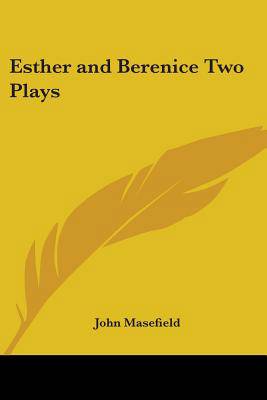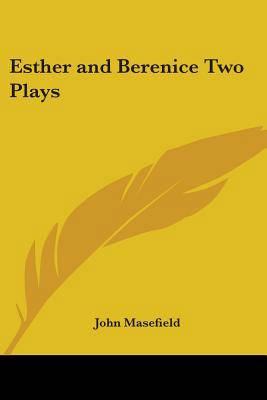
- Afhalen na 1 uur in een winkel met voorraad
- Gratis thuislevering in België vanaf € 30
- Ruim aanbod met 7 miljoen producten
- Afhalen na 1 uur in een winkel met voorraad
- Gratis thuislevering in België vanaf € 30
- Ruim aanbod met 7 miljoen producten
Zoeken
Omschrijving
Esther and Berenice is a book that contains two plays written by John Masefield. The first play, Esther, is a biblical drama that tells the story of Esther, a Jewish queen who saves her people from genocide. The play explores themes of loyalty, courage, and faith, as well as the power of love and the importance of standing up for what is right. The second play, Berenice, is a tragedy that tells the story of the Roman emperor Titus and his love for the Jewish princess Berenice. The play explores themes of love, duty, and sacrifice, as well as the conflict between personal desire and political obligation. Both plays are written in Masefield's poetic and lyrical style, and are considered to be classic examples of English drama.1922. Poet, novelist, dramatist and journalist, Masefield's literary career was a varied one. He went to sea as a youth and his first volumes of poems earned him the title of Poet of the Sea. He was a prolific writer, publishing poetry and novels as well as taking on editorial tasks. In 1930 he became Poet Laureate, a post he retained until his death 37 years later. Masefield explains why these adaptations of Racine were made...We wanted, in short, plays in verse that were of the theater, that could be done with few properties and no scenery, with small casts of from six to nine persons. Knowing how keenly sensitive an English audience is to verse, we wanted plays with fine situations and stirring declamation. The French classical tragedies seemed to offer a foundation of what we needed, so these versions were made. The play of Ester is an adaptation, not a translation, because in Esther our audience asked for something more than the French formality allowed. We could make nothing of Racine's choruses in this play in translation; after some attempts we gave them up, and substituted others. When we came to rehearse the play, we found it too short; we therefore lengthened it. Berenice is a translation. See other titles by this author available from Kessinger Publishing.This scarce antiquarian book is a facsimile reprint of the old original and may contain some imperfections such as library marks and notations. Because we believe this work is culturally important, we have made it available as part of our commitment for protecting, preserving, and promoting the world's literature in affordable, high quality, modern editions, that are true to their original work.
Specificaties
Betrokkenen
- Auteur(s):
- Uitgeverij:
Inhoud
- Aantal bladzijden:
- 236
- Taal:
- Engels
Eigenschappen
- Productcode (EAN):
- 9781417939459
- Verschijningsdatum:
- 26/07/2004
- Uitvoering:
- Paperback
- Formaat:
- Trade paperback (VS)
- Afmetingen:
- 152 mm x 229 mm
- Gewicht:
- 349 g

Alleen bij Standaard Boekhandel
+ 75 punten op je klantenkaart van Standaard Boekhandel
Beoordelingen
We publiceren alleen reviews die voldoen aan de voorwaarden voor reviews. Bekijk onze voorwaarden voor reviews.








